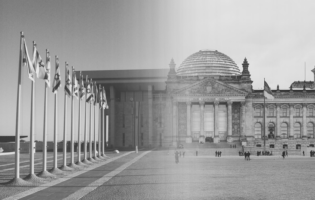
Remembering Pulse
The Power of Community-Driven Collective Memory Natalie Adams-Menendez: Reflection Days before I turned seventeen, I awoke to news that 49 people had been killed and at least 53 others had …
Episode 97: LGBTQ+ Spaces, Public Art, and Memory
Public memorials have many functions: honoring victims, acknowledging history, or symbolizing values. After the 2016 mass shooting at the Pulse nightclub in Orlando, Florida, the site was transformed into an …

Hyperinflation Weimar
One hundred years ago, the Weimar inflation reached its peak. It remains Germany’s greatest economic crisis and has heavily shaped the history of the Federal Republic. Within a few months …

The German-Israeli Relationship: A Chronicle of Four Decades, 1983-2023
On the occasion of the 40th anniversary of AGI, the Society, Culture, and Politics program is pleased to present Dr. Lily Gardner Feldman’s policy brief devoted to understanding four decades …
Recent Authors
AGI provides knowledge, insights, and networks as tools to solve the challenges ahead.
Support Our Work
Statement on Rising Incidents of Anti-Semitism in Germany and the United States
The terrorist attack on Israel on October 7 shocked the world, a stunning, deliberate, and cooardinated act of violence that became the deadliest day for Jews since the end of …

Publication Preview: The German-Israeli Special Relationship
In the coming weeks, the American-German Institute will publish “The German-Israeli Special Relationship: A Chronicle of Four Decades, 1983-2023” from Senior Fellow Dr. Lily Gardner Feldman. In light of the …
Episode 85: Addressing Germany’s Colonial Legacy
Germany is well-known for its robust memory culture that deals with the crimes of National Socialism and the Holocaust; however, it has only recently begun to address legacy of its …

Shifting Structures for Social Cohesion
How Local Organizations Create Inclusive Communities The AGI project on “Social Divisions and Questions of Identity in Germany and the United States” brought together a diverse group of participants to …
Episode 80: 40 Years of AGI—A Conversation with Frank Trommler
On this episode of The Zeitgeist, AGI looks back on the 40 years of the Institute’s work on strengthening the American-German relationship through academic research, policy dialogue, and exchanges. AGI …

Germany’s Changing Culture of Remembrance
New Normative and Empirical Debates Germany’s culture of remembrance of the Holocaust has received renewed attention in recent years. Only very few witnesses and survivors are still with us, and …

The Not-so-Sudden Death of Weimar Democracy
January 30, 1933, the day that Reich President Paul von Hindenburg appointed the Nazi leader Adolf Hitler as chancellor of Germany—and a day whose 90th anniversary we marked last month—was …







